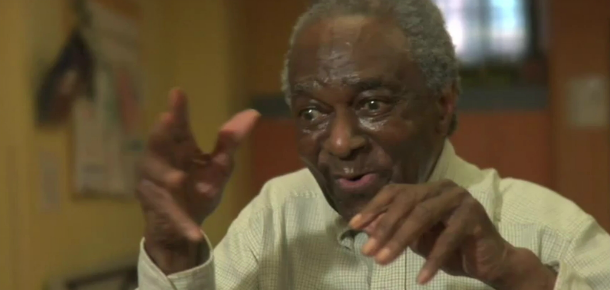Director Michael Rossato-Bennett of Ximotion Media has announced the release of a fascinating new documentary Alive Inside next week in New York.
Alive Inside investigates these questions and the power music has to awaken deeply locked memories. The film follows Dan Cohen, a social worker, who decides on a whim to bring iPods to a nursing home. To his and the staff’s surprise many residents suffering from memory loss seem to “awaken” when they are able to listen to music from their past. With great excitement, Dan turns to renowned neurologist Dr. Oliver Sacks, and we follow them both as we investigate the mysterious way music functions inside our brains and our lives.
Ximotion has released several clips showing the stunning effect of music’s reintroduction into the lives of the elderly through Music And Memory’s iPod Program. These clips have actually been online for some time, but only recently caught the attention of social media junkies.
[yframe url=’http://www.youtube.com/watch?v=Sd5S_hADV30′]
If you think about it, this shouldn’t be a surprise. Last week, I saw a humorous reference to the 1990s ska punk band Reel Big Fish, whose CD I wore out back in the day (don’t judge). Though I hadn’t even thought of the band in over a decade, when I found their hit song Sell Out on YouTube, I was instantly transported to a road trip I took in 1997. It’s the same, but to a greater effect, for Gil and Denise.
In the greater continuing care population, the Music And Memory iPod program works to reduce culture change and the loss of self that often accompanies a move to a nursing home by focusing on a more individualized person-centered care. For more challenging residents, it gives caregivers a powerful tool to assist with their care. The program’s more profound implication, though, is its ability to pierce through mental and physical conditions that other methods can’t touch.
That’s where Henry comes in. Henry suffers severe dementia. He doesn’t recognize his family and has been in a nursing home since his stroke ten years ago. But when they give him music that he knows and prefers, the effect is, well, you have to see it for yourself.
[yframe url=’http://www.youtube.com/watch?v=fyZQf0p73QM’]
The best news is that this restorative effect remains after the headphones come off. In another clip, from Alive Inside, Dr. Concetta Tomaino, Executive Director of the Institute for Music and Neurological Function (IMNF), talks about studies that have have shown that continued use of this sort of music therapy actually improves memory, recall, recognition of family members, and sociability.
I showed these clips to Amy Shade, Art Therapist and Activity Director for a skilled care facility in Dayton, Ohio, and asked her opinion.
I can tell you, without a doubt, that music has a profound effect on people with dementia. I had one resident a few years ago who couldn’t speak, yet she could still sing her favorite hymns. Often we provide radios and CD players in the rooms of residents with dementia, but the usefulness of that set-up is limited. They don’t always possess the ability to focus on the music, they wander away, and it can be hard to hear.
It’s also hard to find exactly the songs they want. CDs provide a genre of music, but it’s hard to pinpoint the exact songs that they enjoy most. (If you gave me a metal CD from the 1990s, how would you know that all I really wanted to hear was Guns N Roses?) With the iPod, not only is it easily carried in a pocket, but it can be set up with exactly the music that is meaningful to that particular resident.
[yframe url=’http://www.youtube.com/watch?v=wftljHCBGbs’]
Shade continued, “I can see this being a nice inter-generational activity as well. Let the teenage grandkids sit down and show grandma how to load grandpa’s favorite old songs onto his new iPod.”
So much of this seems obvious, but the iPod program wasn’t even possible until very recently. Before the iTunes store and other online music delivery systems were invented less than a decade ago, the variety of music available for this sort of program would have been fairly limited. Just as importantly, the invention of iPods and other mp3 players have made it possible to offer residents a greater volume of music in a more manageable way, increasing the odds of connection even more.
Alive Inside premieres on April 18 at New York City’s Ruben Museum, with an additional screening on April 20 and three more on April 21. Contact the Ruben Museum for tickets. No word yet on broadcast to a wider audience, but hopefully it will see national release very soon.


Great leap for fighting.dementia.
Has some great sinister potential too.
In theory, one could implant false memories with the right music playing in background while asking about certain experiences, like the time they took molly ringwald to prom, or burst out into song and dance with matthew broderick to twist and shout.
Fun!